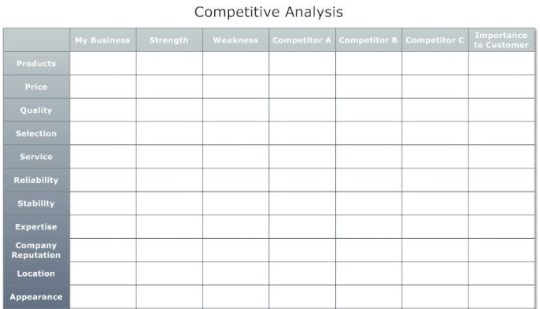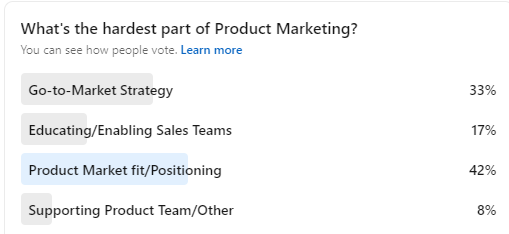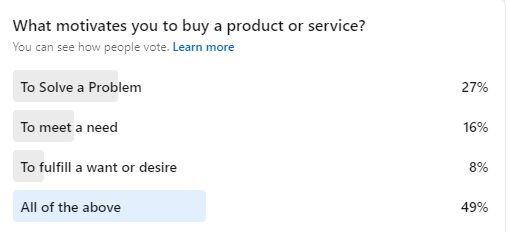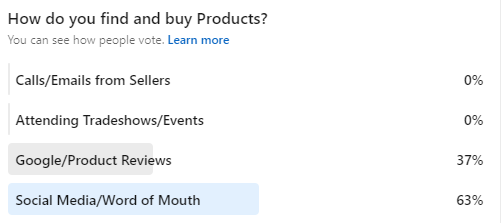How to use Market Research, Competitive Intelligence, Customer Marketing, & Product Marketing to Product Increase Sales
Before businesses can sell anything, they need to determine if there is a market for their products and services.
Most businesses will not necessarily be creating new product categories. As a result, they will be entering into a marketplace that already exists. This is true if you are a re-seller or distributor of products and services. Once you decide that there is a market for your products and services; you need to study your competitors.

Smartsheet.com template
You can see who your competitors are by doing internet research, reading trade publications, and attending industry trade shows. On the internet, you can view your competitors’ websites. Once you have all of this information you need to determine the sales, and marketing channels that you will use to sell your product. Are you going to sell products via a website, direct mail, social media marketing, retail space, trade shows, or a direct sales force? There are many options available to you.
Knowing who could use your product is also something important to consider. If you do not have any existing customers you will need to be the Sales rep for your business to get yourself set up in the marketplace.
To be able to make an effective Sales Presentation to a customer, you will need to compile your Marketing research in competitive analysis and intelligence chart.
You will need to perform a SWOT analysis by assessing your strengths and weaknesses, opportunities, threats compared to your competitors on the products you offer, the price, quality, the service, reliability, stability, expertise, company reputation, location, and appearance of your business along with how important it is to the customer.
This is a must-do even if you do not hire sales reps. But if you, do it should be part of their training. This competitive analysis should be done regularly.
This is how you can apply Marketing research to drive your product sales.
Product Marketing
What is the role of Product Marketing?
I covered the Product Marketing Community workshop to find out.
Workshop Topics included how to:
- Build and execute go-to-market plans
- Develop actionable buyer insights
- Create effective Messaging and Content for buyers
- Enable Sales and Product Teams
Businesses should identify their ideal customer.
What are the challenges of Product Marketing?

Just as Marketing has a plan or brief, Product Marketing does.
SmartSheet.com Product Marketing Template
Here are nine things to address in a Product Marketing Brief.
- What does your company do? Does your product offering align with your business goals?
- What are the features of your product? Do others understand what you are building and why?
- Does this Product address gaps in the Market? Include an overview of a Competitive, win-loss, and, SWOT analysis.
- Who is your ideal customer or target market? Include an overview of findings of demographic, psychographic, and buyer persona research. Does your product solve customer pain points?
- How will you measure product success?
- What are can go wrong? Can failure be anticipated and corrected?
- What is the roadmap and schedule of the product? Who’s responsible and in charge?
- Who needs to be included in the project and who needs to approve deliverables?
- How will goals be tracked? How often will they be monitored? What insights are you trying to glean from the data?
Creating a Buyer Persona
A buyer persona is a guide to understanding the needs, challenges, and pain points of customers.
Questions to ask
What are these customers’ habits?
What concerns, needs and challenges do they have?
What actions are customers taking to address their needs and challenges?
Why do customers need to take these actions?
This question may be applied to multiple action steps described in Hooked by Nir Eyal as the 5 Whys.
What makes them want to buy?
Where do they look for information?
What type of content and medium do they use to access the information?
What days and times are the most likely to look for information and consume content?
It is important to note that businesses with multiple products and more than one target market will need to create buyer personas for each ideal customer.
Where to obtain information on the Ideal Customer
1. Interview current customers and prospects.
2. Send out targeted surveys via email, direct mail, and Social Networks. Offer incentives such as gift cards and discounts to encourage people to provide the information needed.
3. Read biography and history books about your ideal customer.
4. Study the news.
5. Study existing research conducted by Market Research firms.
Building buyer personas will result in:
1. Creating and implementing better and more targeted product messaging and communication
2. Getting the product in front of customers who truly will benefit from its use
How have you used Market Research, and Product Marketing to increase Sales?
Share your thoughts in the comments.
Additional places to find my content and blog
WordPress: http://dangalante.me/
Tumblr: http://www.askdangalante.com/
LinkedIn: https://www.linkedin.com/today/author/DanGalante
Medium https://medium.com/@DanGalante
YouTube https://www.youtube.com/trendsettingsm
Anchor https://anchor.fm/dangalante
About Me
I’m a Strategic Marketer with Field Sales, Sales Enablement, Content Creation, and, Classroom Teacher/Trainer skill-sets using Marketing to drive Sales/Growth.
As a Marketer, I’ve worked with Start-Ups, a Political Campaign, and a Digital Marketing Conference. I’m certified in Inbound Marketing with classes in Marketing, Product Management, Product Marketing, SEO, SEM.
Before teaching, I was an Outside Sales and Marketing Rep. selling and marketing dental products to Dentists using consultative selling, trade show marketing, field marketing, and market research.
I publish Sales, Marketing & Social Media Today a blog covering industry events and trends.
Articles and insights have been featured, mentioned, and, referenced in:
Tractica in the News
The Future of AI
https://medium.com/@DanGalante/the-future-of-ai-insights-from-the-ai-summit-ab6267eca70b
Digital Marketing World Forum
Voice Summit
Compilation: Our Favorite Post-VOICE Coverage So Far
https://www.voicesummit.ai/blog/compilation-our-favorite-post-voice-coverage
Engage Bay
7 Steps to Align your Marketing Automation Strategy
https://www.engagebay.com/blog/marketing-automation-strategy/
Relay 42
The Role of Technology in Customer-Centricity
https://relay42.com/resources/blog/the-role-of-technology-in-customer-centricity
Databox
How to Improve Marketing and Sales Alignment (Gave background)
https://databox.com/how-to-improve-sales-marketing-alignment
Onalytica
Named as a Top STEM Influencer for EdTech and Education Industry Insights.
http://www.onalytica.com/blog/posts/stem-top-influencers-brands-publications/
The Arizona Republic
http://yourbusiness.azcentral.com/handle-top-10-sme-sales-objections-24845.html
Twitter Ads Blog
https://blog.twitter.com/2014/how-smartphone-users-engage-on-twitter-three-key-findings
Paper.li’s Wall Of Fame via Scoop.it
http://www.scoop.it/t/all-things-paper-li/?tag=Dan+Galante
I’ve been honored for my Social Profiles
•LinkedIn SSI Score in the Top 1%
•SlideShare for being in the top 5% of profiles viewed in 2014
•LinkedIn Profile was in the top 1% of profiles viewed out of 200 million members in 2012
I’m seeking a full-time role in:
Inbound Marketing, Digital Marketing, Content Marketing, Product Marketing, Demand Generation, Social Media Marketing, Sales Enablement Enablement, Sales Strategy, Marketing Strategy, Employer Branding, Recruitment Marketing. Reach out to start a conversation on LinkedIn or email me at dan@dangalante.com


